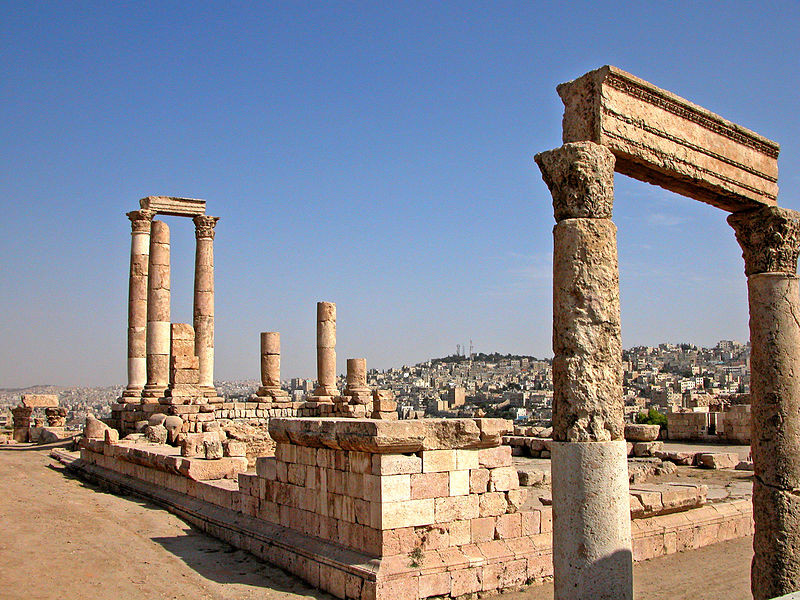8 Aug. David defeats the Ammonites at Rabbah
“When Nahash king of the Ammonites died, his son Hanun became king after him. David said, ‘Nahash was loyal to me, so I will be loyal to his son Hanun.’ So David sent his messengers to comfort Hanun about his father’s death.”
“David’s officers went to the land of the Ammonites. But the Ammonite leaders said to Hanun, their master, ‘Do you think David wants to honour your father by sending men to comfort you? No! David sent them to study the city and spy it out and capture it!”
“So Hanun arrested David’s officers. To shame them he shaved off half their beards and cut off their clothes at the hips. Then he sent them away.”
“When the people told David, he sent messengers to meet his officers because they were very ashamed. King David said, ‘Stay in Jericho until your beards have grown back. Then come home.’”
“The Ammonites knew that they had insulted David. So they hired 20,000 Aramean foot soldiers from Beth Rehob and Zobah. They also hired the king of Maacah with 1,000 men and 12,000 from Tob.”
“When David heard about this, he sent Joab with the whole army. The Ammonites came out and prepared for battle at the city gate. The Arameans from Zobah and Rehob and the men from Tob and Maacah were out in the field by themselves.”
“Joab saw that there were enemies both in front of him and behind him. So he chose some of the best soldiers of Israel and sent them out to fight the Arameans. Joab put the rest of the army under the command of Abishai, his brother. Then he sent them out to fight the Ammonites.”
“Joab said to Abishai, ‘If the Arameans are too strong for me, you must help me. Or, if the Ammonites are too strong for you, I will help you. Be strong. We must fight bravely for our people and the cities of our God. The LORD will do what he thinks is right.’”
“Then Joab and the army with him went to attack the Arameans, and the Arameans ran away. When the Ammonites saw that the Arameans were running away, they also ran away from Abishai and went back to their city. So Joab returned from the battle with the Ammonites and came to Jerusalem.”
(2 Samuel 10:1-14)

In today’s passage, the former Ammonite king Nahash is called a “loyal” ally of King David (2 Samuel 10:1). In reality, this means that the people of Rabbah (modern-day Amman in Jordan) were part of a vassal kingdom who acknowledged the overlordship of Israel, and paid appropriate taxes to King David.
When a vassal king died, it was not unusual to send officials to remind the successor of his obligations to his overlord. So while the account of David’s emissary is couched in terms of sending “messengers to comfort Hanun about his father’s death” (2 Samuel 10:2), there was no doubt an underlying political motive in sending his officers to the new king of the Ammonites.
The new king’s officials realised that David was sending his messengers to re-assert his overlordship, and warned Hanun that David might even be going further and preparing for an attack on Rabbah if the new king refused to accept the terms previously imposed on his father.
The young king decided to assert his independence, and deliberately insulted David by humiliating his messengers. Shaving off their beards was seen as an act of great humiliation at that time. Having thrown down the gauntlet, Hanun prepared for a retaliatory attack from the Israelites by hiring 33,000 mercenary soldiers from several surrounding kingdoms.
When Joab arrived at Rabbah with the Israelite forces, he found the Ammonite army inside the city walls ready to come out to battle. But he also discovered that he’d been surrounded, as the 20,000 Aramean foot soldiers had taken up their positions at his rear.
Faced with this attack on two fronts, Joab quickly divided his forces in two, and led a crack force of Israelite soldiers in an immediate attack on the Arameans – who were taken by surprise and began to flee. When the Ammonites saw that the Arameans had been routed, they changed their minds about an open confrontation with the Israelites, and retreated back inside the city walls of Rabbah. Joab returned to Jerusalem with his army intact and ready to fight the Ammonites on another day.
The narrative goes on to recount that the Arameans subsequently banded together into a larger force under Shobach at Helem, where they were defeated by David’s army. As a result, the Arameans also became a vassal state and were unable to help the Ammonites again in the future (see 2 Samuel 10:15-19).
The photo (by Dennis Jarvis) shows remains of the Roman Temple of Hercules at the ancient citadel of Rabbah-Amman.
You can read more about David’s victories @ https://www.thebiblejourney.org/biblejourney2/30-israel-becomes-a-kingdom-under-saul-and-david/davids-victories-over-israels-neighbours/
